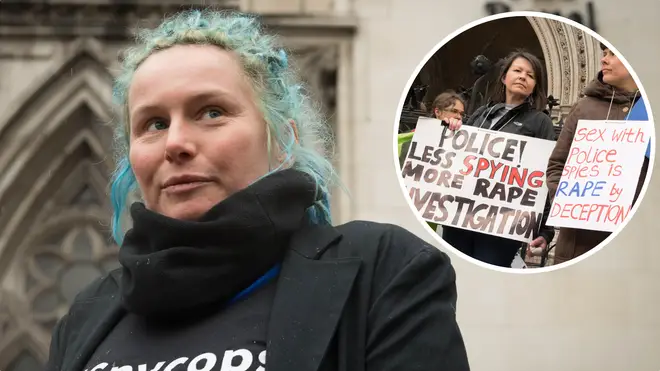
Nick Ferrari 7am - 10am
25 January 2022, 13:01 | Updated: 25 January 2022, 14:02

The Metropolitan Police has been forced to pay out thousands in compensation after a woman said she was deceived into a nearly two-year relationship with an undercover officer.
Environmental activist Kate Wilson won £230,000 in compensation in the landmark tribunal case against the Metropolitan Police over breaches of her human rights.
The 41-year-old began a relationship with Mark Stone shortly after first meeting him in 2003 and had a "whirlwind romance" for more than a year before they split amicably in 2005, when she moved to Spain.
But five years later, Ms Wilson found out that Mark Stone was actually an undercover alias for a married police officer called Mark Kennedy, who had been ordered by the Met Police to spy on the activists.
On Monday, the Investigatory Powers Tribunal (IPT) ordered the Met and the National Police Chiefs Council (NPCC) to pay a total of £229,471.96 to Ms Wilson "by way of just satisfaction for the breaches" under the European Convention on Human Rights.
Kennedy had sexual relationships with as many as 10 other women during his deployment, including one with a woman known only as "Lisa" which lasted for six years before she discovered a passport in his real name.
Read more: Met police apologise to woman nine years after 'sexist and dehumanising' strip search
Read more: Met Police launches investigation into 'a number' of Downing Street and Whitehall parties

Met Police launches investigation into Downing Street parties
The tribunal concluded: "This is not just a case about a renegade police officer who took advantage of his undercover deployment to indulge his sexual proclivities, serious though this aspect of the case unquestionably is.
"Our findings that the authorisations under (the Regulation of Investigatory Powers Act 2000) were fatally flawed and the undercover operation could not be justified as 'necessary in a democratic society' ... reveal disturbing and lamentable failings at the most fundamental levels."
The NPCC said there have been "significant" changes to undercover policing since the Kennedy affair came to light.
After the ruling today, Helen Ball, the Met's Assistant Commissioner for Professionalism, said: "We recognise the gravity of the judgment in this case, which outlined a series of serious failings that allowed Kennedy to remain deployed on a long-term undercover deployment without the appropriate level of supervision and oversight.
"This resulted in Ms Wilson's human rights being breached.
"In entering into a sexual relationship, Kennedy's actions went against the training and guidelines undercover officers received at the time.
"However, the tribunal found that the training was inadequate and more should have been done to consider the risks of male undercover officers forming relationships with women. We accept these findings."
Read more: Senior Met officers sacked for 'appalling' treatment of staff and misuse of credit card
Read more: Sex addict anti-terror cop jailed after hiding spy cameras to film women naked in hotels

Are the Met Police doing enough to restore trust?
Ms Wilson had brought legal action against the Met and the NPCC for breaches of her right to freedom from inhumane and degrading treatment, her right to privacy and right to freedom of expression.
The Met and NPCC accepted that Kennedy's actions amounted to a breach of those rights, but they had denied that other officers, apart from Kennedy and his cover officer, knew or suspected Wilson was in a sexual relationship with Kennedy.
In a ruling last September, the IPT found the Met's claims that undercover officers (UCOs) knew sexual relationships were banned were "materially undermined by the sheer frequency with which (Kennedy) (and other UCOs) did conduct sexual relationships without either questions being asked or action being taken by senior officers".
The IPT also found that the Met and NPCC's failure to guard against the risk of UCOs entering into sexual relationships with women amounted to unlawful discrimination against women.
Read more: Exclusive LBC poll: Only half of Londoners trust the Met

Cressida Dick admits trust "shaken" in Met after Sarah Everard murder
Chief Constable Alan Pughsley, the NPCC lead for undercover policing, said: "The training is significantly more rigorous than that during Mark Kennedy's time, both in duration and content.
"Cover officers and those supervising and managing operations are now required to complete standardised training courses tailored to their roles.
"The psychological fitness and wellbeing of undercover officers is a key consideration during their recruitment, training and deployment.
"In addition to the relevant laws, regulations and rules in place, the conduct of undercover officers is governed by a National Code of Conduct and the College of Policing's Code of Ethics.
"Significant work has been undertaken to ensure undercover officers and those authorising their deployment understand the legal limits within which they operate, including the core concepts of deployments needing to be necessary and proportionate, and the need to minimise collateral intrusion into the private lives of others. "
Adding: "As the tribunal in this case acknowledged, undercover policing remains an effective and vital tactic in the fight against serious organised crime.
"Officers in these roles put themselves at great risk every day to protect the public."